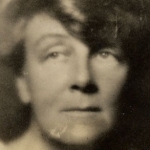Hence loathed Melancholy,
Of Cerberus, and blackest Midnight born,
In Stygian cave forlorn,
'Mongst horrid shapes, and shrieks, and sights unholy;
Find out some uncouth cell,
Where brooding Darkness spreads his jealous wings,
And the night-raven sings;
There under ebon shades, and low-brow'd rocks,
As ragged as thy locks,
In dark Cimmerian desert ever dwell.
But come thou goddess fair and free,
In heav'n yclep'd Euphrosyne,
And by men, heart-easing Mirth,
Whom lovely Venus at a birth
With two sister Graces more
To Ivy-crowned Bacchus bore;
Or whether (as some sager sing)
Zephyr, with Aurora playing,
As he met her once a-Maying,
There on beds of violets blue,
And fresh-blown roses wash'd in dew,
Fill'd her with thee, a daughter fair,
So buxom, blithe, and debonair.
Haste thee nymph, and bring with thee
Jest and youthful Jollity,
Quips and cranks, and wanton wiles,
Nods, and becks, and wreathed smiles,
Such as hang on Hebe's cheek,
And love to live in dimple sleek;
Sport that wrinkled Care derides,
And laughter holding both his sides.
Come, and trip it as ye go
On the light fantastic toe,
And in thy right hand lead with thee,
The mountain-nymph, sweet Liberty;
And if I give thee honour due,
Mirth, admit me of thy crew
To live with her, and live with thee,
In unreproved pleasures free;
To hear the lark begin his flight,
And singing startle the dull night,
From his watch-tower in the skies,
Till the dappled dawn doth rise;
Then to come in spite of sorrow,
And at my window bid good-morrow,
Through the sweet-briar, or the vine,
Or the twisted eglantine;
While the cock with lively din,
Scatters the rear of darkness thin,
And to the stack, or the barn door,
Stoutly struts his dames before;
Oft list'ning how the hounds and horn
Cheerly rouse the slumb'ring morn,
From the side of some hoar hill,
Through the high wood echoing shrill.
Sometime walking, not unseen,
By hedge-row elms, on hillocks green,
Right against the eastern gate,
Where the great sun begins his state,
Rob'd in flames, and amber light,
The clouds in thousand liveries dight.
While the ploughman near at hand,
Whistles o'er the furrow'd land,
And the milkmaid singeth blithe,
And the mower whets his scythe,
And every shepherd tells his tale
Under the hawthorn in the dale.
Straight mine eye hath caught new pleasures
Whilst the landskip round it measures,
Russet lawns, and fallows gray,
Where the nibbling flocks do stray;
Mountains on whose barren breast
The labouring clouds do often rest;
Meadows trim with daisies pied,
Shallow brooks, and rivers wide.
Towers, and battlements it sees
Bosom'd high in tufted trees,
Where perhaps some beauty lies,
The cynosure of neighbouring eyes.
Hard by, a cottage chimney smokes,
From betwixt two aged oaks,
Where Corydon and Thyrsis met,
Are at their savoury dinner set
Of herbs, and other country messes,
Which the neat-handed Phyllis dresses;
And then in haste her bow'r she leaves,
With Thestylis to bind the sheaves;
Or if the earlier season lead
To the tann'd haycock in the mead.
Sometimes with secure delight
The upland hamlets will invite,
When the merry bells ring round,
And the jocund rebecks sound
To many a youth, and many a maid,
Dancing in the chequer'd shade;
And young and old come forth to play
On a sunshine holiday,
Till the live-long daylight fail;
Then to the spicy nut-brown ale,
With stories told of many a feat,
How Faery Mab the junkets eat,
She was pinch'd and pull'd she said,
And he by friar's lanthorn led,
Tells how the drudging goblin sweat,
To earn his cream-bowl duly set,
When in one night, ere glimpse of morn,
His shadowy flail hath thresh'd the corn
That ten day-labourers could not end;
Then lies him down, the lubber fiend,
And stretch'd out all the chimney's length,
Basks at the fire his hairy strength;
And crop-full out of doors he flings,
Ere the first cock his matin rings.
Thus done the tales, to bed they creep,
By whispering winds soon lull'd asleep.
Tower'd cities please us then,
And the busy hum of men,
Where throngs of knights and barons bold,
In weeds of peace high triumphs hold,
With store of ladies, whose bright eyes
Rain influence, and judge the prize
Of wit, or arms, while both contend
To win her grace, whom all commend.
There let Hymen oft appear
In saffron robe, with taper clear,
And pomp, and feast, and revelry,
With mask, and antique pageantry;
Such sights as youthful poets dream
On summer eves by haunted stream.
Then to the well-trod stage anon,
If Jonson's learned sock be on,
Or sweetest Shakespeare, Fancy's child,
Warble his native wood-notes wild.
And ever against eating cares,
Lap me in soft Lydian airs,
Married to immortal verse,
Such as the meeting soul may pierce
In notes with many a winding bout
Of linked sweetness long drawn out,
With wanton heed, and giddy cunning,
The melting voice through mazes running,
Untwisting all the chains that tie
The hidden soul of harmony;
That Orpheus' self may heave his head
From golden slumber on a bed
Of heap'd Elysian flow'rs, and hear
Such strains as would have won the ear
Of Pluto, to have quite set free
His half-regain'd Eurydice.
These delights if thou canst give,
Mirth, with thee I mean to live.




Comment form: